As many business owners know, building a brand takes time, money, and a lot of effort. Once you’ve spent that time, money, and effort, you will want to protect that brand by seeking trademark protection. Therefore, it is important to consider these five issues when choosing a name for your new product or service, or choosing a new trademark for an old product or service, to ensure maximum trademark protection. This is the first in a five part series which explores the considerations for creating a strong trademark.
1. Strength
When selecting a brand name or product name, it is wise to consider the strength of the mark. Some trademarks are stronger and thus more protectable than others. To determine what makes a mark stronger than another mark, the USPTO analyzes marks based on distinctiveness. Trademarks are often separated into five categories of distinctiveness: (1) fanciful (strongest); (2) arbitrary (strong); (3) suggestive (medium); (4) descriptive (weak); and (5) generic (no protection).
Fanciful or Coined Marks
These marks comprise of a word or words that are made up and have no meaning other than as a brand name. For example, Exxon® gasoline and Pepsi® for soft drinks. Such marks generally receive the broadest scope of protection, because they did not exist until created as the name of the product or service.
Arbitrary Marks
These marks include words that already exist and have a common, known meaning but not in relation to the goods or services for which they are used as brand names. For example, Apple® for computers is a strong trademark, because it does not describe a quality or characteristic of a computer.
Suggestive Marks
These marks suggest some attribute or benefit of the goods or services, but do not describe the goods themselves. Suggestive trademarks require imagination, thought, or perception to reach a conclusion regarding the nature of the goods or services. Chicken of the Sea® is a suggestive mark because it requires viewers of the mark to use their imagination to conclude the product is canned tuna fish.
Descriptive Marks
Terms that immediately describe goods, services, or their characteristics cannot be protected as a trademark. Descriptive words merely convey information and are not distinctive, and thus generally not protectable, since they simply describe some aspect of the goods or services, and do not serve to distinguish them from the goods or services of others. Geographically descriptive terms and surnames tend to fall in this category.
However, it is possible for a descriptive word or phrase to become distinctive, and thus receive trademark protection, if the public has come to recognize the mark and associates the mark with the products or services as coming from one source. In such cases, the term is said to have “acquired distinctiveness” or “secondary meaning.” Terms can acquire distinctiveness through advertising, promotion, and extensive use over time, for example, Mrs. Fields’ Cookies® for cookies and baked goods or Ford® for automobiles.
Generic Marks
A generic term or common words for a type of product or service (such as dish washer, watch, popcorn, or credit card) can never be a trademark or service mark for that product or service. This is because the generic word defines the product or service, but not its source, and it would prevent others from rightfully using the common name for the product or service that they make. A famous example of a word that once was entitled to trademark protection but is now generic is escalator, because the general public recognizes the term ‘escalator’ as the name for a moving stairway.
Trademarks are among a company’s most valuable assets. Trademarks are linked to the company’s identity and goodwill. Developing and protecting those trademarks can be critical to the success and value of a business. Failing to protect trademark rights can have devastating effects on a company.
For more information about trademarks and how to register a trademark, contact us.


